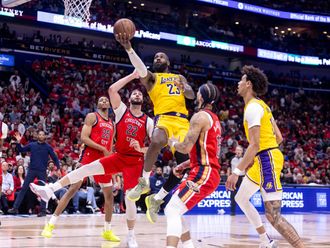New York: Disgraced cyclist Lance Armstrong, who was stripped of his seven Tour de France titles for doping, is weighing whether to admit he used performance-enhancing drugs, The New York Times reported Friday.
Armstrong has told associates and anti-doping officials that in an effort to restore his credibility so he can become a competitive athlete again he is considering admitting publicly that he used blood transfusions and banned drugs during his cycling career, the newspaper reported.
The Times did not name its sources but cited “several people with direct knowledge of the situation.”
The International Cycling Union (UCI) late last year effectively erased Armstrong from the cycling history books when it decided not to appeal sanctions imposed on the American by the United States Anti-Doping Agency (USADA).
A damning report by USADA concluded that Armstrong helped orchestrate the most sophisticated doping program in the history of sport. The report included hundreds of pages of eyewitness testimony, emails, financial records and laboratory analysis of blood samples.
Armstrong has vehemently denied ever having doped.
Tim Herman, a lawyer for Armstrong, told the Times he was not aware of any admission plans.
“I do not know about that. I suppose anything is possible, for sure. Right now, that’s really not on the table,” Herman was quoted as saying.
The newspaper said the 41-year-old Armstrong is seeking to meet with both David Howman, the director general of the World Anti-Doping Agency, and USADA chief executive Travis Tygart.
Herman denied that Armstrong has tried to contact Tygart or Howman.
Cancer survivor Armstrong is the founder of Livestrong and it is believed the cancer-fighting charity is pressuring him to come clean as a way to save the organization from further damage.
Athletes who confess to doping are eligible for reduced punishment under the World Anti-Doping code.
Not only was Armstrong stripped of his Tour de France titles but he was barred for life from competing in Olympic competitions.
The lifetime ban also extends to some of the sanctioned regional triathlons and running events that Armstrong has been competing in since he stopped racing in the Tour de France. Many of those events adhere to the World Anti-Doping Code.
Armstrong won the Tour de France from 1999-2005 but his career crashed following the USADA report, which also has caused him to lose many of his corporate sponsors.
He is also the subject of a whistle-blowing lawsuit filed by his former cycling teammate Floyd Landis and a British newspaper, The Sunday Times, has filed a lawsuit to try and recover $500,000 paid to Armstrong to settle a libel suit.












